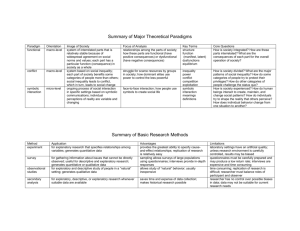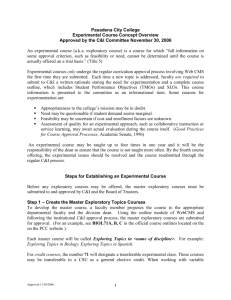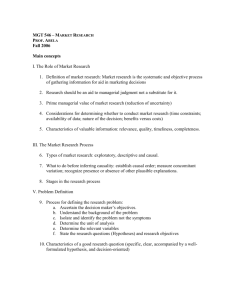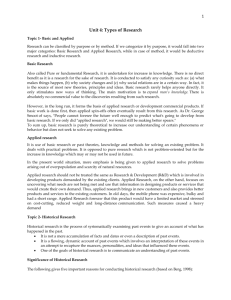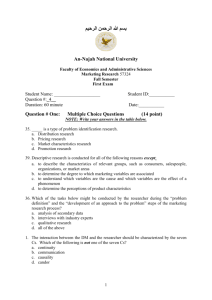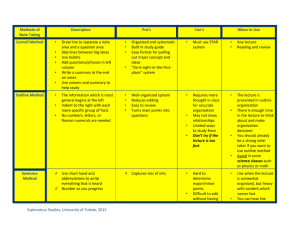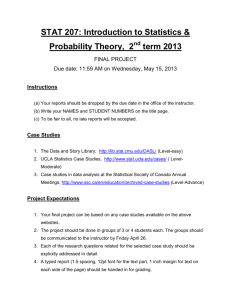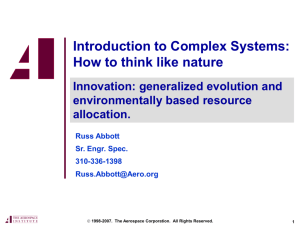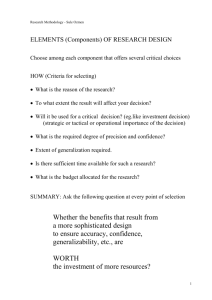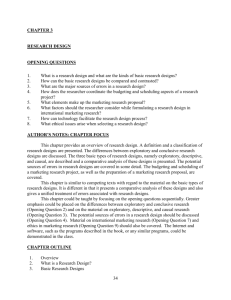SCOPE OF INVESTIGATION 2.1. exploratory 2.2 descriptive 2.3
advertisement
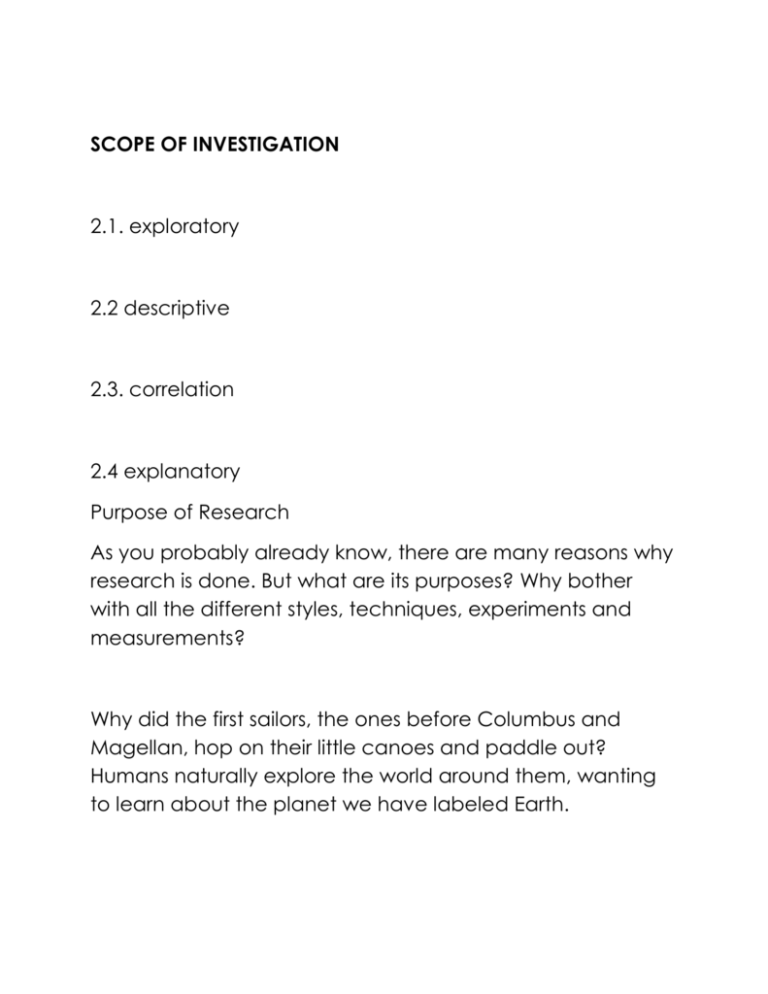
SCOPE OF INVESTIGATION 2.1. exploratory 2.2 descriptive 2.3. correlation 2.4 explanatory Purpose of Research As you probably already know, there are many reasons why research is done. But what are its purposes? Why bother with all the different styles, techniques, experiments and measurements? Why did the first sailors, the ones before Columbus and Magellan, hop on their little canoes and paddle out? Humans naturally explore the world around them, wanting to learn about the planet we have labeled Earth. Why did Hippocrates and Galen examine and write about the maladies of man? The need to describe and understand our world is found in even the youngest children. Why did we develop an entire group of sciences to understand humans? Because what good is being human if you cannot explain why we do something. Maybe I am being a little to 'meta' about all this. The purpose of psychology is to explore, to describe and to explain how and why a person thinks, feels and acts. Exploratory Research Exploratory research is defined as the initial research into a hypothetical or theoretical idea. This is where a researcher has an idea or has observed something and seeks to understand more about it. An exploratory research project is an attempt to lay the groundwork that will lead to future studies, or to determine if what is being observed might be explained by a currently existing theory. Most often, exploratory research lays the initial groundwork for future research. To make this a little more understandable, imagine you are blindfolded or placed into a room without light. You are not told if something is in the room, but you have a suspicion there is something in there. You shuffle out slowly into the room, exploring with the tips of your fingers until you find something. Exploratory research can come in two big forms: either a new topic or a new angle. A new topic is often unexpected and startling in its findings. For example, American psychologist John Watson really began his behaviorism research with a new topic on the study of human behaviors and learning: rats! Because humans have brains and rats have brains, it makes a certain kind of sense. There was an attempt to find the universal laws of learning in all brains. New angles can come from new ways of looking at things, either from a theoretical perspective or a new way of measuring something. For instance, computers have allowed large populations to be looked at. Old experiments can now involve thousands of people from around the globe instead of a few people from the local train station. Descriptive Research Once the groundwork is established, the newly explored field needs more information. The next step is descriptive research, defined as attempts to explore and explain while providing additional information about a topic. This is where research is trying to describe what is happening in more detail, filling in the missing parts and expanding our understanding. This is also where as much information is collected as possible instead of making guesses or elaborate models to predict the future - the 'what' and 'how,' rather than the 'why.' Remember that room you're blind in? Descriptive research is the act of exploring the thing in the dark, creating a fuller picture of what you are looking at. It is not quite as tentative as exploratory, but you still are not 100% sure what you've found, although you're starting to get an idea. You begin to fill in what you know with what you find. A psychological example is the use of CT scans, MRI, fMRI, PET, and SPECT imaging to describe the living brain. We now have the clearest picture in all of history of the thinking, living brain. Just a few decades ago, a person who wanted to look at a living brain had two options: a really blurry CT scan without any detail or to crack open the skull and peel back the protective layers around the brain. Both options are better than a century ago, where you kind of had to wait for someone to die to examine their brain. Research over the last few decades has been expanding our understanding, providing descriptions of the active processes in the brain. One field that is quickly growing is the field of forensic psychology. Over the last few decades, studies exploring the decision making process of police officers, the techniques used to question witnesses and the jury processes are all being examined. There has been an active interest in many researchers to explore the field that the judicial system needs. For instance, looking into eyewitness memory studies reveals research explaining and describing the factors that influence what people see. For example, did you know that a person with different lights shining at different angles on a person's face can alter a person's entire look, including their ethnicity? How about that even in broad daylight, people still get gender of perpetrators and victims mixed up? Explanatory Research We began exploring something new with exploratory research. Then, we conducted descriptive research to increase our knowledge of it. Lastly, we need to explain it. Explanatory research is defined as an attempt to connect ideas to understand cause and effect, meaning researchers want to explain what is going on. Explanatory research looks at how things come together and interact. This research does not occur until there is enough understanding to begin to predict what will come next with some accuracy. The person in the dark has fully explored the elephant and understands what it looks like. Now, the process of 'how did it get here' and 'where is it going next' comes into play. This often requires imaginative studies, more so than just touching an elephant in the dark




